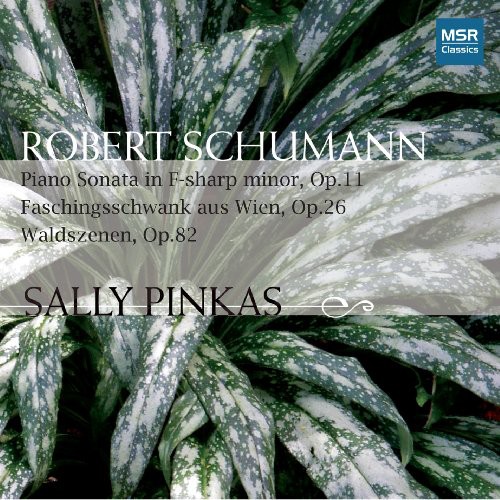Show results for
Deals
- 4K Ultra HD Sale
- Action Sale
- Alternative Rock Sale
- Anime sale
- Award Winners Sale
- Bear Family Sale
- Blu ray Sale
- Blues on Sale
- British Sale
- Classical Music Sale
- Comedy Music Sale
- Comedy Sale
- Country Sale
- Criterion Sale
- Electronic Music sale
- Fantasy Film and TV
- Folk Music Sale
- Hard Rock and Metal Sale
- Horror Sci fi Sale
- Jazz Sale
- Kids and Family Music sale
- Kids and Family Sale
- Metal Sale
- Music Video Sale
- Musicals on Sale
- Mystery Sale
- Naxos Label Sale
- Olive Films on Sale
- Page to Screen Sale
- Paramount Sale
- Pop and Power Pop
- Rap and Hip Hop Sale
- Reggae Sale
- Rock and Pop Sale
- Rock Legends
- Soul Music Sale
- TV Sale
- TV Sale
- Vinyl on Sale
- War Films and Westerns on Sale

Sonata in F Sharp minor
- Format: CD
- Release Date: 3/10/2009

Sonata in F Sharp minor
- Format: CD
- Release Date: 3/10/2009
- Composers: Robert Schumann
- Performers: Sally Pinkas
- Label: MSR Classics
- UPC: 681585132326
- Item #: SRD513232
- Genre: Classical
- Release Date: 3/10/2009
- This product is a special order

Product Notes
REVIEWS American Record Guide - November / December 2009: 'Judging by this Schumann program [Sally Pinkas] is a force to be reckoned with and has a natural feeling for the peculiarities of the composer's idiom. She also writes her own lucid notes and is given excellent sound from the Spaulding Auditorium at Dartmouth... [her piano] is a fine-sounding instrument, near ideal for Schumann... All of these performances have a sweep and passion to them, without pushing the button too far. Her technical ability handles all that the composer can thrust at her.' Paul Orgel, Classical Voice of New England - October 2009: 'Sally Pinkas is a distinguished NH and Boston-based pianist, and, as expected, this all-Schumann recital does not disappoint... In Pinkas' performance [of Faschingsschwank aus Wien] I particularly like the teasing quality of the scherzo and the good humor that comes across in the opening movement... The huge Sonata No. 1 is the most successful of Schumann's three piano sonatas, and Pinkas plays it as well as I have ever heard it played, presenting the 1st movement's extended narrative with encompassing sweep and understanding, finding the heart-rending qualities of the 2nd movement's "Aria," and the arch humor of the 3rd. She holds the sprawling last movement together with wonderfully consistent rhythm. My previous favorite recording of this work was a soulful version by Claudio Arrau, but Pinkas' performance surpasses that one and her recording has far better sound. This MSR CD was recorded in the Spaulding Auditorium of Dartmouth's Hopkins Center and produced by Pinkas' husband, pianist Evan Hirsch. He has managed to capture the instrument's brightness with a sense of the hall's reverberance, but also allows the listener to experience a wide dynamic range that permits Schumann's softer music to register. Bravo! Pinkas' playing [of Waldszenen] like her well-written liner notes, tends toward sensible clarification... I find Pinkas' Waldscenen to be a lovely, unpretentious performance full of telling details and rhythmic precision. Sally Pinkas is obviously a member in good standing of the "Davidsbund", Schumann's imaginary band of enlightened appreciators of true art.' NOTES Robert Schumann's creative outpourings, both musical and literary, reflect the ardent romantic spirit of 19th century Germany. Schumann left behind a comprehensive oeuvre of instrumental and vocal compositions. In addition, throughout his short life he remained at the forefront of a heated literary debate, becoming one of the most influential musical commentators of his generation. His greatest contribution as a composer, arguably, was to the repertoire for solo piano (until 1840 he wrote predominantly for the piano). He himself had hoped to become a pianist in his youth, and his marriage to the celebrated pianist Clara Wieck was to keep him intimately involved with the instrument for the rest of his life. Schumann's musical style followed the paths explored by his admired predecessors Beethoven and Schubert. The pianoforte of his time has evolved, however: it had a wider pitch range, as well as the capacity to produce a richer and louder sound than that produced by earlier keyboards. Schumann scored ambitiously for this larger instrument, challenging the pianist to create a dense, almost orchestral sound. Further, the emotionally charged content of his music requires the performer to reach beyond the technical, into the spiritual realm. The rewards are considerable, as both performer and listener are drawn to the exuberant vitality of a passionate nature. The first two works on this disc, the energetic Faschingsschwank aus Wien and the ambitious Sonata in F-sharp minor, were written when the composer was in his twenties, during a period of great personal upheaval. Waldszenen was written a decade later, during a stable period in Schumann's life, and indeed it shows greater simplicity and introspection. Schumann explored a variety of musical structures: Faschingsschwank and Waldszenen are cycles of character pieces (program music), and the Sonata is modeled on a classical form (absolute music). Chronology and form notwithstanding, Schumann the poet remains true to his feelings throughout all three works.

